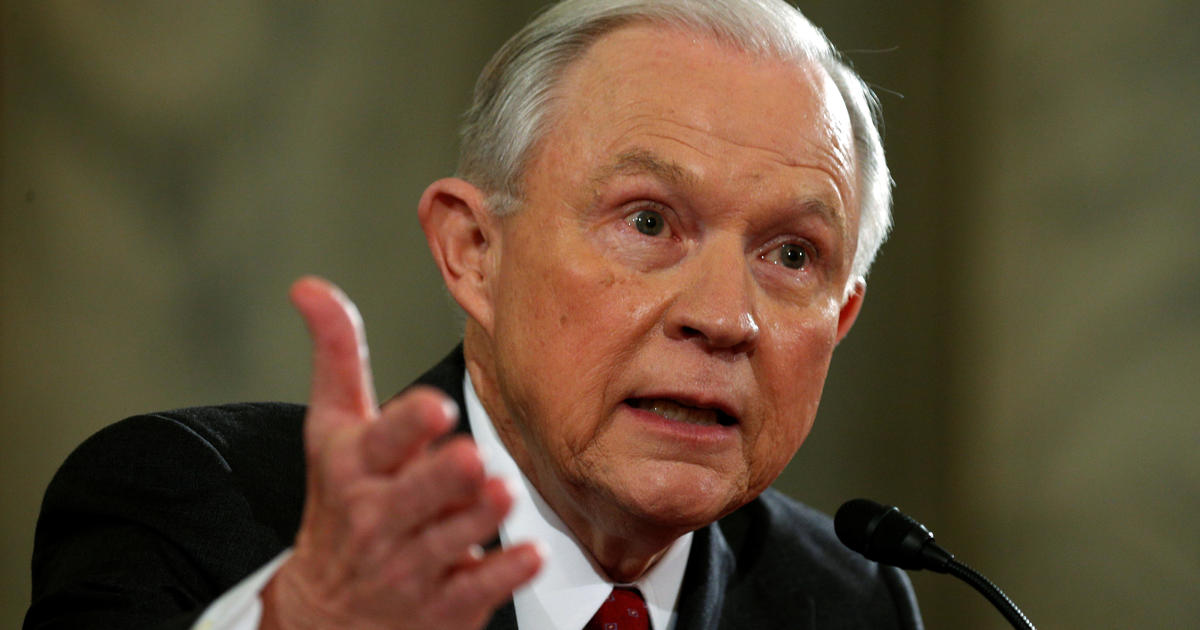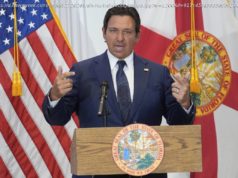 Republicans on the Senate Judiciary Committee mostly defended Sessions, expressing confidence that he would be confirmed, while Democrats used the opportunity to attack his voting record.
Republicans on the Senate Judiciary Committee mostly defended Sessions, expressing confidence that he would be confirmed, while Democrats used the opportunity to attack his voting record.
The Alabama Republican, who has served in the Senate for 20 years, was even asked a question about the 2005 “Access Hollywood” tape that surfaced in October in which President-elect Donald Trump made lewd comments about women.
“Is grabbing a woman by her genitals, without consent, is that sexual assault?” Sen. Patrick Leahy, D-Vermont, asked Sessions.
“Clearly it would be,” Sessions said.
During his confirmation hearing for attorney general, Sen. Jeff Sessions said he would recuse himself from an investigation into Hillary Clinton’…
Sessions also announced during the hearing that he would recuse himself from any investigations involving Hillary Clinton and her use of private email servers as secretary of state.
“I believe the proper thing for me to do, would be to recuse myself from any questions involving those kind of investigations that involve Secretary Clinton and that were raised during the campaign or to be otherwise connected to it,” Sessions told members of the Senate Judiciary Committee.
Mr. Trump said during the second general-election debate between the president-elect and Clinton that he would instruct his attorney general to appoint a special prosecutor to look into her situation.
Senate Minority Whip Dick Durbin, D-Illinois, asked if Sessions would recuse himself as attorney general if the probe into Russian interference in the election leads to involvement by the Trump campaign or associates of the president-elect.
“My recusal issue was because I had made public comments about it that could be construed on the final judgment on it,” Sessions said about his decision to recuse himself from Clinton investigations. “I will review it and try to do the right thing,” Sessions promised. Durbin said that it would be “an obvious case for special prosecutor.”
During the day-long hearing, which is scheduled to continue Wednesday, Sessions rejected allegations that he has failed to protect the voting rights of black people and that he has praised the Ku Klux Klan.
“These are damnably false charges,” Sessions said. “I abhor the Klan and what it represents and its hateful ideology.”
Sessions said during the hearing, which was interrupted by sporadic outbursts from protesters, that he “never declared the NAACP was un-American or that a civil rights attorney “was a disgrace to his race.”
President-elect Donald Trump’s pick for attorney general took some difficult questions during his confirmation hearing on Capitol Hill. Sessions…
“I deeply understand the history of civil rights in our country and the horrendous impact that relentless and systemic discrimination and the denial of voting rights has had on our African-American brothers and sisters. I have witnessed it. We must continue to move forward and never back. I understand the demands for justice and fairness made by our LGBT community. I will ensure that the statutes protecting their civil rights and their safety are fully enforced,” he said in his opening statement.
Sen. Amy Klobuchar, D-Minnesota, asked Sessions to explain his previous comment in which he described the Voting Rights Act as an “intrusive piece of legislation” and asked him how he’ll actively enforce the remaining pieces of the law such as the one that prohibits voting practices that discriminate on the basis of race.
“The Voting Rights Act passed in 1965 was one of the most important acts to deal with racial difficulties that we face,” Sessions said. “It changed the whole course of history particularly in the south.” Sessions was asked about states’ voter ID laws and he said, “I think voter ID laws, properly drafted, are okay.”
Leahy, the former top Democrat on the panel, asked Sessions if he agrees with Mr. Trump’s original plan to ban Muslims from entering the U. S.
“I have no belief and I do not support the idea that Muslims, as a religious group, should be denied admission to the United States,” Sessions said.
Senator Jeff Sessions told the Judiciary Committee that he believes Muslim should not be banned from the United States.
Sessions said that Mr. Trump has since made clear that he believes that the focus should be on people who are coming from countries with histories of terrorism. At the same time, Sessions suggested that he believes that religious beliefs, that embrace wanting to harm the U. S., can be taken into consideration in the vetting process and can be grounds to deny someone entry into the country.
Sen. Mazie Hirono, D-Hawaii, later asked Sessions what he would characterize as an extreme view in relation to enhanced vetting.
“First of all, the vetting process is in the hands of the State Department and the consular offices,” Sessions said, adding that the approach that’s “preferable” is focusing on people who are based in areas “where we have an unusually high risk of terrorists coming in.”
Democrats repeatedly pointed out that Sessions has voted against bans against torture and grilled him on what he would do as attorney general if Mr. Trump tried to bring back waterboarding or other enhanced interrogation techniques.
Attorney general nominee Sen. Jeff Sessions agrees that it is illegal for the military to waterboard or use any form of torture.
“There was a dispute about that when we had the torture definition in our law,” Sessions said when asked if he believes whether waterboarding constitutes torture.
“The Department of Justice memorandum concluded it did not necessarily prohibit that. But Congress has taken an action now that makes it absolute improper and illegal to use waterboarding or any other form of torture in the United States by our military and by all our other departments and agencies.”
Sen. Lindsey Graham, R-South Carolina, asked Sessions whether he plans to advise Mr. Trump to reverse President Obama’s 2012 execution action that created DACA, or Deferred Action for Childhood Arrivals, that has deferred deportations for hundreds of thousands of people who came to the U. S. illegally as children.
“It would certainly be constitutional, I believe, to end that order,” Sessions said. “I think would have no objection to a decision to abandon that order because it is very questionable, in my opinion, constitutionally.”
Asked what should happen to 800,000 kids who have come out of the shadows, Sessions didn’t directly answer that question except that Congress should work with the administration to pass immigration reform. Durbin later said that Sessions “opposed the only bipartisan effort that we’ve had on the Senate floor in modern memory.”
Sessions was asked if he believes that the Russians were behind the cyberattacks during the 2016 election.
“I have done no research into that. I just know what the media has said about it,” said Sessions, who was also asked if he has any reason to doubt the accuracy of the conclusion of the U.






